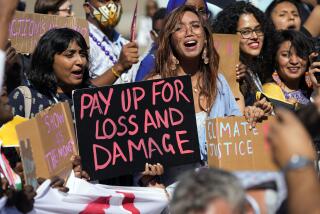BUILDUP IN THE PERSIAN GULF : U.S., Britain, Gulf States Renew Vows : Alliance: Kuwait’s Arab neighbors say they will help defray cost of military buildup. They also pledge to deter any future Iraqi aggression.
- Share via
KUWAIT CITY — Asserting that the latest Gulf crisis is not over despite an apparent Iraqi retreat, the United States, Britain and six oil-rich monarchies agreed Wednesday to continue their present military buildup and vowed future action to sap Saddam Hussein’s capacity to threaten his neighbors.
The Gulf Cooperation Council, a regional rich nations club led by Saudi Arabia, agreed to pay a substantial part of the cost of deploying U.S., British and other allied troops to defend Kuwait against any Iraqi aggression.
Secretary of State Warren Christopher told reporters here following a strategy session with British Foreign Secretary Douglas Hurd and the six Gulf council foreign ministers that the allies agreed unanimously to devise ways to prevent the Iraqi dictator from taking sudden provocative actions such as sending troops south to the Kuwaiti border as Hussein did last week.
“We are resolved and committed that Hussein shall not be permitted to project the world into crisis at his whim,” Christopher told a news conference, with Hurd and Prince Saud al Faisal, the Saudi foreign minister, at his side.
Christopher said no specific measures have been selected. Other officials have suggested creation of a buffer zone on the Iraqi side of the border, from which Iraqi tanks, artillery and other heavy weapons would be excluded.
France and Russia--which both have trade ties with Iraq--have balked at such a zone, with French officials asserting that Iraq’s internal military movements were not illegal and a Russian delegation arriving in Baghdad to discuss ways of defusing the crisis.
A senior U.S. official traveling with Christopher said a “no-tank” zone would seem to fulfill the objective of the United States, Britain and the Gulf states. But he said there are other ways of reaching that goal.
Another official said the measures must be tough enough to have an impact but cannot be so strict that governments such as France and Russia would refuse to go along.
The Gulf Cooperation Council--whose members are Saudi Arabia, Kuwait, United Arab Emirates, Qatar, Oman and Bahrain--said in a formal communique that the allied military buildup “should continue until they are sure that Iraq no longer poses a threat.”
The council said Iraq’s decision to withdraw some of its troops in the face of the allied countermeasures did not erase the latest demonstration of Hussein’s willingness to use force. Christopher said flatly, “The crisis is not over,” despite Iraqi withdrawals.
A senior State Department official said before Iraq’s latest military maneuver that many Gulf council officials had begun to lose their Gulf War distrust of Hussein and his policies. Now, he said, the distrust “has been restored completely.”
Christopher obtained the endorsement of U.S. policy from the council just one day after King Hussein of Jordan expressed “deep sadness, disappointment and anger” at the recent Iraqi action. The king, who had shown sympathy for Iraq four years ago, issued his strongest condemnation of the latest Iraqi adventure at a joint news conference with the secretary of state.
After the Gulf council meeting, Christopher visited Camp Doha, a military base 40 miles south of the Iraqi border, to meet some of the 1,400 soldiers of the 24th Mechanized Infantry Division who have arrived from Ft. Stewart, Ga., in the past few days.
Christopher said the Gulf council agreed to “equitably share the cost of our efforts” and to create a special fund to finance the military action. He said there are no firm estimates as yet of the cost of the operation, so it is impossible to determine how much each of the six Gulf states will contribute.
Another senior official said later that the Gulf states probably will put up most of the money, as they did in 1990 and 1991, when a U.S.-led coalition forced Iraq out of Kuwait. But the official said Saudi Arabia paid a disproportionately large share of the 1990-91 costs and is anxious for its partners to shoulder more of the burden this time. Kuwait agreed to provide more of the cash this time, he said.
In addition, the six Gulf countries agreed to allow allied warplanes to fly over and land in each of the countries.
They also ordered military units of the council-controlled Peninsula Shield Force to join in the defense of Kuwait.
More to Read
Sign up for Essential California
The most important California stories and recommendations in your inbox every morning.
You may occasionally receive promotional content from the Los Angeles Times.










